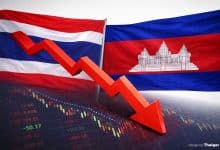Vietnam cuts bank stake limits to curb market manipulation risks

Vietnam’s legislature passed a resolution to decrease the maximum stake investors can own in domestic banks. Coming into force in July, the law will limit the equity held by institutional investors, such as pension or investment funds, to 10%, down from the current 15%. The adjustment has been made in an attempt to mitigate the risk of market manipulation.
This regulatory adjustment comes after Vietnam’s most significant financial fraud case to date was revealed in late 2022. Real estate Mogul Truong My Lan is alleged to have drained US$12.5 billion from one of Vietnam’s largest private banks, the Saigon Joint Stock Commercial Bank (SCB), exploiting her effective control of the bank through nominees.
The latest reform has gained support from over 90% of the National Assembly deputies, who anticipate that the stricter ownership limitations will prevent similar fraudulent activities in the future. However, critics argue that such measures are not guaranteed to be effective as previous caps did not stop fraud from occurring.
There are also concerns that the reform may deter investments in banks during a period when Vietnam’s banking system is grappling with an increase in bad loans and the threat of a property sector crisis. The new regulation contradicts the ongoing requests from foreign investors to eliminate or increase the existing 30% cap on total foreign ownership of banks.
Foreign investors are typically closer to the current maximum than domestic ones; hence, the revised limit on institutional shareholding could further discourage foreign investment. In response to these concerns, legislators decided not to reduce another limit on individual ownership, which will remain capped at 5%, despite initial plans to reduce it to 3%.
The reform also grants increased authority to Vietnam’s central bank to intervene swiftly in instances of large cash withdrawals from banks or early indications of bank distress. This follows the SCB scandal, which triggered a bank run and forced the central bank to take over the institution, reported Bangkok Post.
Latest Thailand News
Follow The Thaiger on Google News:


























